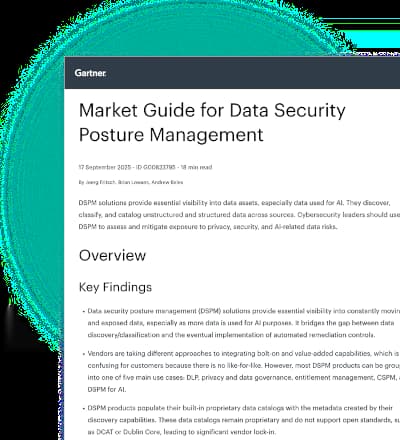Data Risk Management: Get A Step Ahead of Data Loss
0 分鐘閱讀

Bryan Arnott
You could say that keeping up with your daily responsibilities is all about time management.
Ensuring the safety of your organization’s sensitive information? Well, that would fall squarely on data risk management.
Data risk management is an approach to data security that uses data risk assessments and regular analysis to protect organizations from threats by identifying potential incidents and ensuring resilience.
In the modern enterprise, it plays a fundamental role in safeguarding crown jewels such as intellectual property, Personally Identifiable Information (PII), Personal Health Information (PHI) and more from data loss.
How Data Risk Management Works
At its core, data risk management involves a blend of technological solutions and framework-driven strategies designed to mitigate risks and maintain the trust of stakeholders.
Technology plays a crucial role in data risk management by providing advanced capabilities that bolster endpoint security, network security and cloud security to safeguard data. Alongside these technologies, robust processes and frameworks such as risk assessments and data governance policies are essential to establishing a secure environment. By harmonizing technology and policy, organizations can create a resilient defense system against potential data threats.
A critical component of data risk management is conducting a thorough Data Risk Assessment (DRA). The DRA evaluates the current state of data security, identifies potential vulnerabilities and prioritizes risks based on their impact and likelihood. The insights gained from this assessment guide the development and implementation of effective data risk management practices, ensuring that all potential threats are addressed proactively.
By regularly performing these assessments, organizations can adapt their strategies to evolving risks, providing a continuous shield of protection for their valuable data assets.
Why a Data Risk Assessment is Critical
A DRA excels at identifying threats to your data through a comprehensive data risk analysis, which uncovers potential vulnerabilities and provides a clear picture of where your systems stand in terms of security.
This comprehensive evaluation not only pinpoints the weak spots but also prioritizes them based on their potential impact, enabling your team to address the most pressing threats first.
The results of a data risk assessment are invaluable in pulling together a high-performing data security strategy. By integrating risk assessment data into your security blueprint, you can tailor your defenses to the specific needs and risks of your organization. This targeted approach not only enhances the effectiveness of your security measures but also maximizes resource allocation, ensuring that every effort counts toward safeguarding your data.
Stay Proactive to Prevent Data Loss
In today's fast-paced digital landscape, companies must be ready to adapt their data security strategy at a moment's notice.
As new risks emerge and technology evolves, continuous data risk analysis – and making adjustments based on it – becomes essential. Taking a proactive approach to data risk management enables organizations to stay ahead of these threats by adjusting as needed to maintain a robust defense.
Here’s how this looks in practice:
- Discover data across cloud and on-premises storage.
- Classify structured and unstructured data based on criticality.
- Prioritize threats to neutralize based on data risk analysis.
- Protect data through expansive security policy enforcement.
- Monitor security performance and adjust policies as necessary.
This approach to data risk management enables organizations to blend risk analysis with framework and technology for comprehensive, forward-facing protection. Three technologies that make this possible are:
- Forcepoint Data Security Posture Management (DSPM): Powers data discovery, classification and orchestration, as well as on-going DRAs.
- Forcepoint ONE Data Security: Fuels data loss prevention and security policy enforcement across web, cloud, email and endpoint.
- Forcepoint Risk-Adaptive Protection: Enables automatic, real-time adjustments to policies based on the context of user behavior and emerging threats to data.
Start your data risk management journey today by requesting a free data risk assessment from our experts.

Bryan Arnott
閱讀更多文章 Bryan ArnottBryan Arnott is a Senior Content Marketer and Digital Strategist at Forcepoint.
 Executive Guide to DSPM: Visibility and Control over Sensitive DataRead the eBook
Executive Guide to DSPM: Visibility and Control over Sensitive DataRead the eBook
X-Labs
直接將洞察力、分析與新聞發送到您的收件箱










